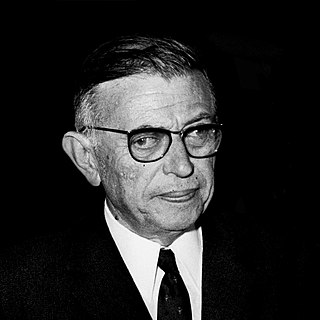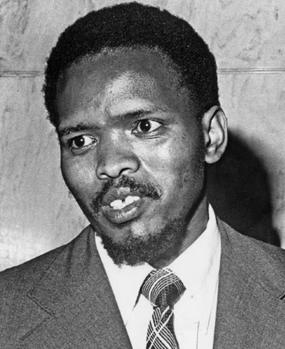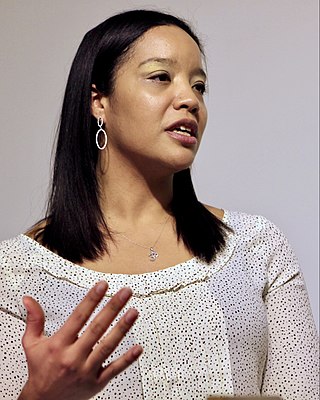Related Research Articles

Existentialism is a form of philosophical inquiry that explores the issue of human existence. Existentialist philosophers explore questions related to the meaning, purpose, and value of human existence. Common concepts in existentialist thought include existential crisis, dread, and anxiety in the face of an absurd world and free will, as well as authenticity, courage, and virtue.

Jean-Paul Charles Aymard Sartre was a French philosopher, playwright, novelist, screenwriter, political activist, biographer, and literary critic, considered a leading figure in 20th-century French philosophy and Marxism. Sartre was one of the key figures in the philosophy of existentialism. His work has influenced sociology, critical theory, post-colonial theory, and literary studies. He was awarded the 1964 Nobel Prize in Literature despite attempting to refuse it, saying that he always declined official honors and that "a writer should not allow himself to be turned into an institution."

Bantu Stephen Biko OMSG was a South African anti-apartheid activist. Ideologically an African nationalist and African socialist, he was at the forefront of a grassroots anti-apartheid campaign known as the Black Consciousness Movement during the late 1960s and 1970s. His ideas were articulated in a series of articles published under the pseudonym Frank Talk.

Simone Lucie Ernestine Marie Bertrand de Beauvoir was a French existentialist philosopher, writer, social theorist, and feminist activist. Though she did not consider herself a philosopher, nor was she considered one at the time of her death, she had a significant influence on both feminist existentialism and feminist theory.

Frantz Omar Fanon was a Francophone Afro-Caribbean psychiatrist, political philosopher, and Marxist from the French colony of Martinique. His works have become influential in the fields of post-colonial studies, critical theory, and Marxism. As well as being an intellectual, Fanon was a political radical, Pan-Africanist, and Marxist humanist concerned with the psychopathology of colonization and the human, social, and cultural consequences of decolonization.
Being and Nothingness: An Essay on Phenomenological Ontology, sometimes published with the subtitle A Phenomenological Essay on Ontology, is a 1943 book by the philosopher Jean-Paul Sartre. In the book, Sartre develops a philosophical account in support of his existentialism, dealing with topics such as consciousness, perception, social philosophy, self-deception, the existence of "nothingness", psychoanalysis, and the question of free will.
Négritude is a framework of critique and literary theory, mainly developed by francophone intellectuals, writers, and politicians in the African diaspora during the 1930s, aimed at raising and cultivating "Black consciousness" across Africa and its diaspora. Négritude gathers writers such as sisters Paulette and Jeanne Nardal, Martinican poet Aimé Césaire, Abdoulaye Sadji, Léopold Sédar Senghor, and Léon Damas of French Guiana. Négritude intellectuals disavowed colonialism, racism and Eurocentrism. They promoted African culture within a framework of persistent Franco-African ties. The intellectuals employed Marxist political philosophy, in the Black radical tradition. The writers drew heavily on a surrealist literary style, and some say they were also influenced somewhat by the Surrealist stylistics, and in their work often explored the experience of diasporic being, asserting one's self and identity, and ideas of home, home-going and belonging.
African philosophy is the philosophical discourse produced in Africa or by indigenous Africans. African philosophers are found in the various academic fields of present philosophy, such as metaphysics, epistemology, moral philosophy, and political philosophy.

Bad faith is a sustained form of deception which consists of entertaining or pretending to entertain one set of feelings while acting as if influenced by another. It is associated with hypocrisy, breach of contract, affectation, and lip service. It may involve intentional deceit of others, or self-deception.

Nausea is a philosophical novel by the existentialist philosopher Jean-Paul Sartre, published in 1938. It is Sartre's first novel.
Lewis Ricardo Gordon is an American philosopher at the University of Connecticut who works in the areas of Africana philosophy, existentialism, phenomenology, social and political theory, postcolonial thought, theories of race and racism, philosophies of liberation, aesthetics, philosophy of education, and philosophy of religion. He has written particularly extensively on Africana and black existentialism, postcolonial phenomenology, race and racism, and on the works and thought of W. E. B. Du Bois and Frantz Fanon. His most recent book is titled: Fear of Black Consciousness.
The Black Consciousness Movement (BCM) was a grassroots anti-apartheid activist movement that emerged in South Africa in the mid-1960s out of the political vacuum created by the jailing and banning of the African National Congress and Pan Africanist Congress leadership after the Sharpeville Massacre in 1960. The BCM represented a social movement for political consciousness.
[Black Consciousness'] origins were deeply rooted in Christianity. In 1966, the Anglican Church under the incumbent, Archbishop Robert Selby Taylor, convened a meeting which later on led to the foundation of the University Christian Movement (UCM). This was to become the vehicle for Black Consciousness.
In philosophy, facticity has multiple meanings — from "factuality" and "contingency" to the intractable conditions of human existence.
Robert L. Bernasconi is Edwin Erle Sparks Professor of Philosophy at Pennsylvania State University. He is known as a reader of Martin Heidegger and Emmanuel Levinas, and for his work on the concept of race. He has also written on the history of philosophy.
Richard Turner, known as Rick Turner, was a South African academic and anti-apartheid activist who was murdered, possibly by the South African security forces, in 1978. Nelson Mandela described Turner "as a source of inspiration".
Black existentialism or Africana critical theory is a school of thought that "critiques domination and affirms the empowerment of Black people in the world". Although it shares a word with existentialism and that philosophy's concerns with existence and meaning in life, Black existentialism is "is predicated on the liberation of all Black people in the world from oppression". Black existentialism may also be seen as method, which allows one to read works by African-American writers such as W. E. B. Du Bois, James Baldwin, and Ralph Ellison in an existentialist frame. As well as the work of Civil Rights Activists such as Malcolm X and Cornel West. Lewis Gordon argues that Black existentialism is not only existential philosophy produced by Black philosophers but is also thought that addresses the intersection of problems of existence in black contexts.
Africana philosophy is the work of philosophers of African descent and others whose work deals with the subject matter of the African diaspora. The name does not refer to a particular philosophy, philosophical system, method, or tradition. Rather, Africana philosophy is a third-order, metaphilosophical, umbrella-concept used to bring organizing oversight to various efforts of philosophizing. Africana philosophy is a part of and developed within the field of Africana studies.

Kathryn Sophia Belle, formerly known as Kathryn T. Gines, is an American philosopher. She is associate professor of philosophy at Pennsylvania State University. Much of her work has focused on increasing diversity within philosophy, and she is the founding director of the Collegium of Black Women Philosophers.

Adrian Margaret Smith Piper is an American conceptual artist and Kantian philosopher. Her work addresses how and why those involved in more than one discipline may experience professional ostracism, otherness, racial passing, and racism by using various traditional and non-traditional media to provoke self-analysis. She uses reflection on her own career as an example.
George Dewey Yancy is an American philosopher who is the Samuel Candler Dobbs Professor of Philosophy at Emory University. He is a distinguished Montgomery Fellow at Dartmouth College, one of the college's highest honors. In 2019–20, he was the University of Pennsylvania's Inaugural Provost's Distinguished Visiting Faculty Fellow. He is the editor for Lexington Books' "Philosophy of Race" book series. He is known for his work in critical whiteness studies, critical philosophy of race, critical phenomenology, and African American philosophy, and has written, edited, or co-edited more than 20 books. In his capacity as an academic scholar and a public intellectual, he has published over 200 combined scholarly articles, chapters, and interviews that have appeared in professional journals, books, and at various news sites.
References
- ↑ A South African Philosopher’s Intellectual and Political Journey
- ↑ Mabogo P. More, The Intellectual Foundations of the Black Consciousness Movement
- ↑ More than a Black Philosopher, The Con, 2015
- ↑ Biko: Philosophy, Identity and Liberation, UNISA Press
- ↑ Looking Through Philosophy in Black: Memoirs
- ↑ Sartre on Contingency: Antiblack Racism and Embodiment